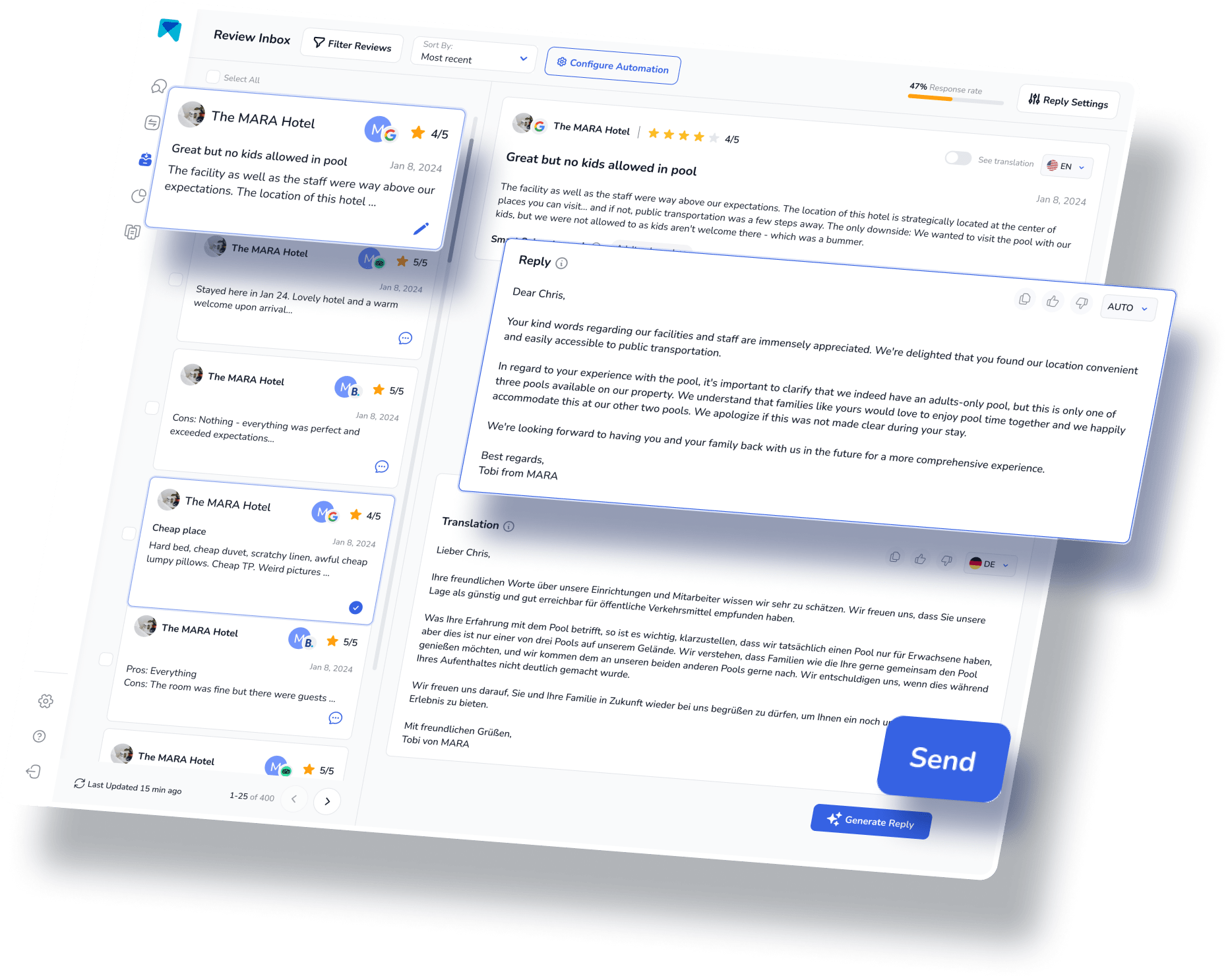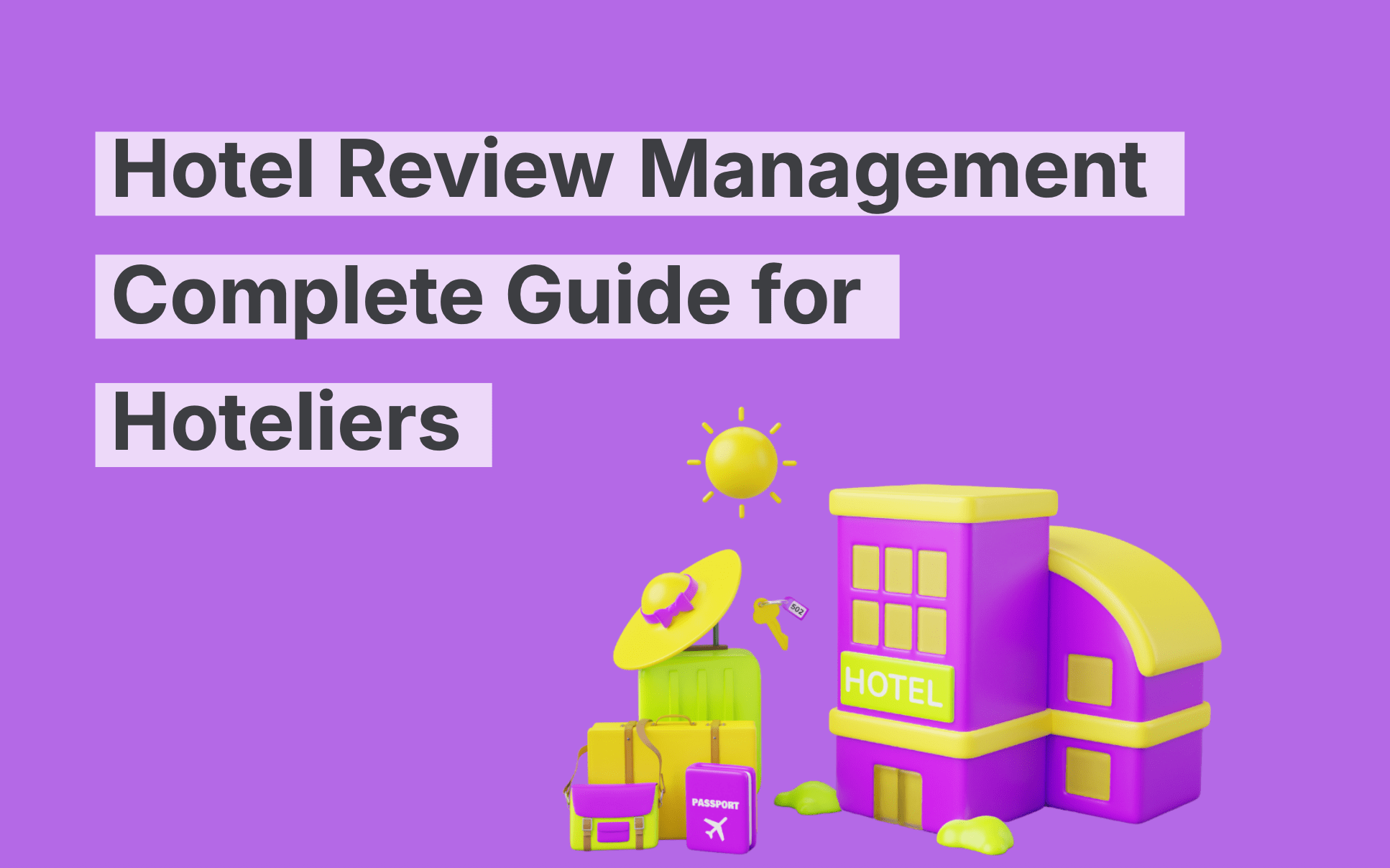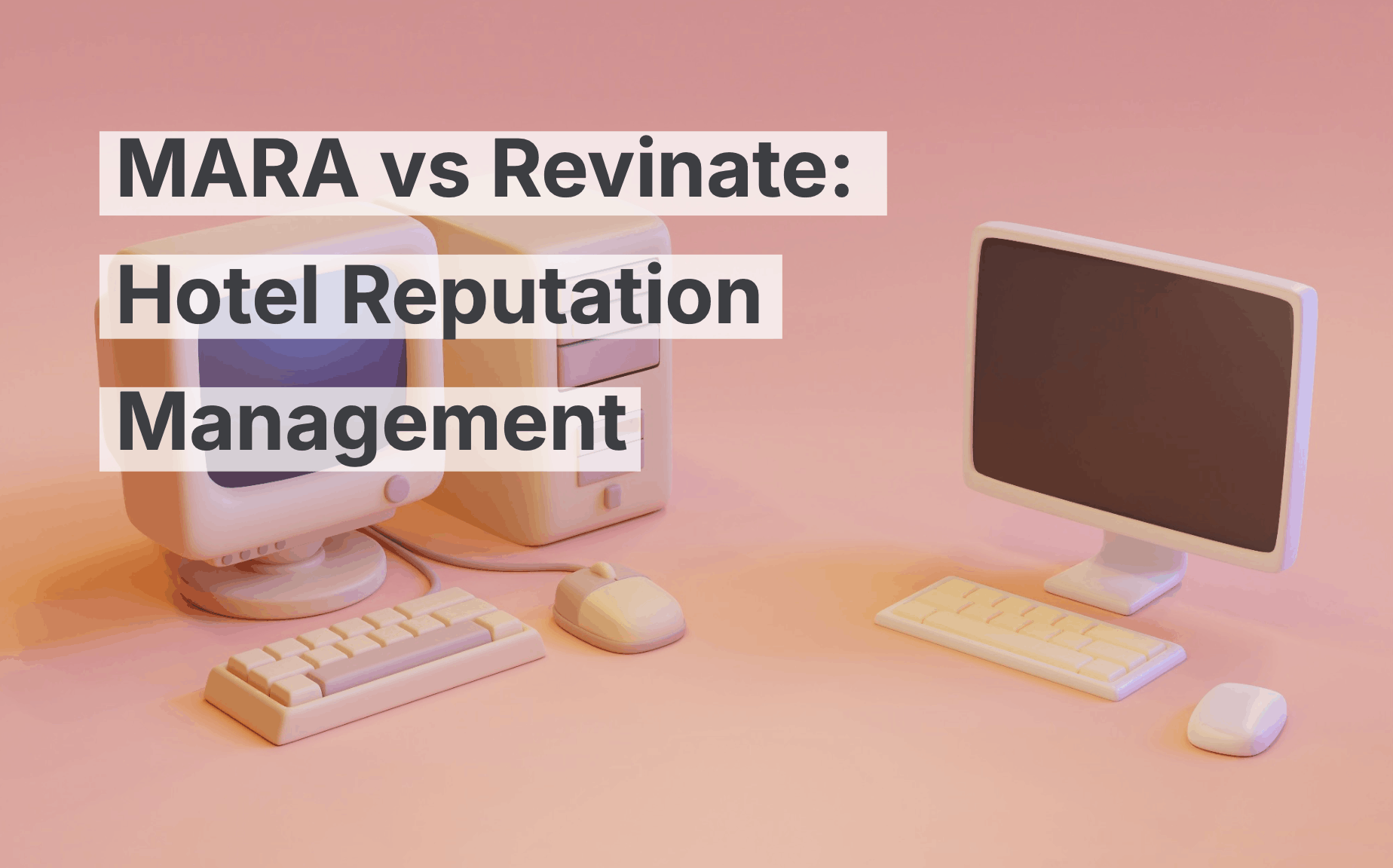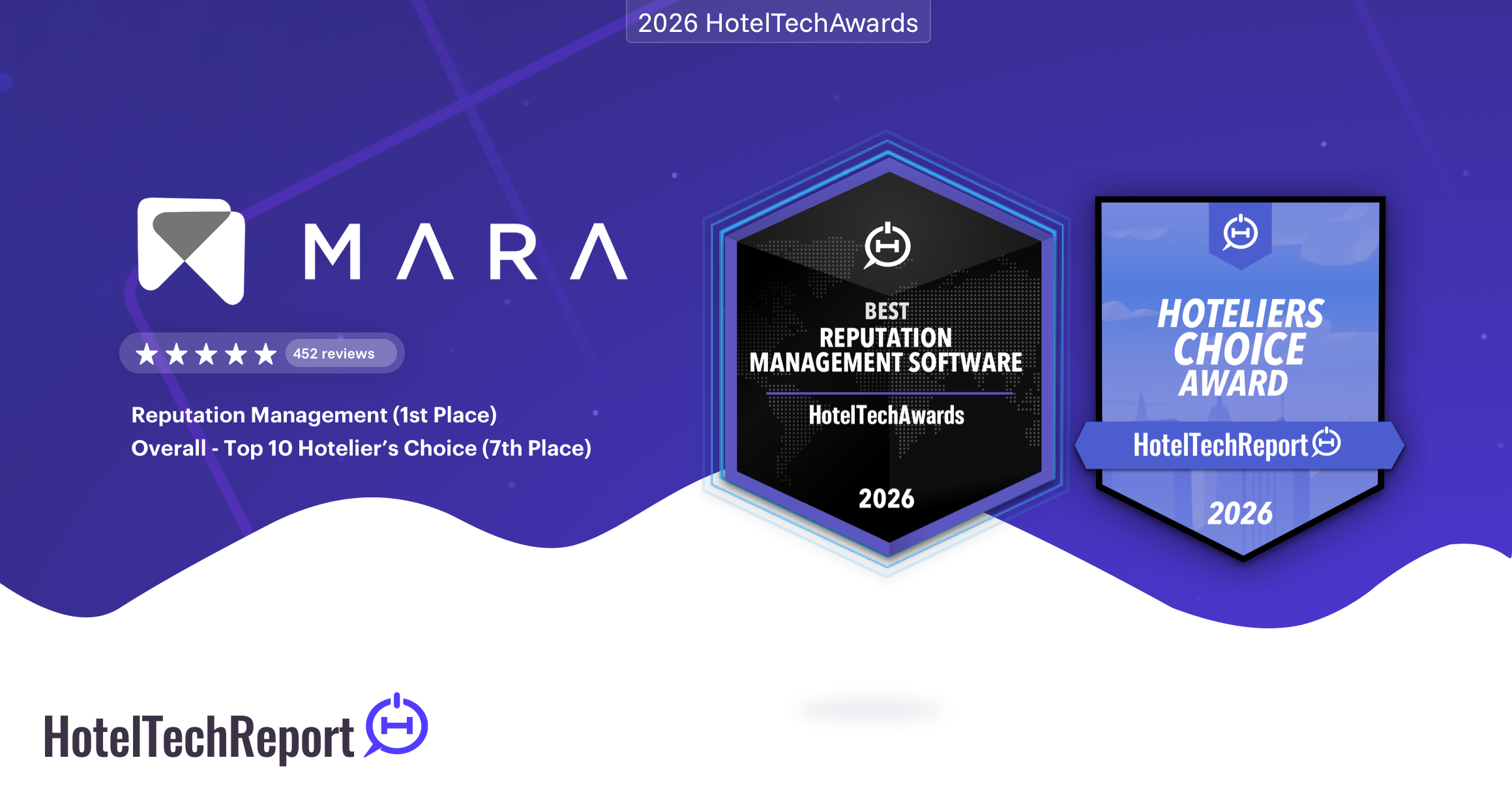Online reviews have become an integral part of consumer decision-making. Whether it's selecting a hotel for your vacation or choosing a service provider for your everyday needs, people heavily rely on the experiences shared by others. However, with the growing significance of online reviews, businesses are increasingly tempted to manipulate this feedback through a practice known as review gating.
In this article, we delve into the concept of review gating, exploring its implications and offering alternative strategies for this reputation management strategy.
What is the meaning of review gating?
Review gating refers to a practice where businesses selectively solicit positive feedback while discouraging or prohibiting negative reviews from customers. Hotels typically send out a survey via email, asking guests about their satisfaction. If the feedback is positive, they encourage the guest to publish the review on platforms like Google or TripAdvisor. However, if the feedback is negative, they do not prompt the guest to publish it and instead keep it as private feedback.
This practice is akin to admitting only well-dressed patrons into an exclusive club while redirecting others to a less desirable entrance. Essentially, it creates an artificial portrayal of a business's reputation by showcasing only positive feedback while concealing negative experiences.

Unfortunately, recent research suggests that online reviews manipulation affects approximately 10.3% of products. Moreover, customers often struggle to detect sentiment manipulation and generally accept the feedback they encounter. Suspicion may arise mainly when businesses boast seemingly high ratings.
{{blog-cta="/features/product-updates"}}
Is review gating illegal?
Review gating, while not necessarily illegal in a criminal sense, is widely considered misleading and is against the policies of major review platforms like Google and TripAdvisor. It can lead to severe penalties, including the removal of reviews or suspension of business listings. Additionally, engaging in review gating can have legal implications under consumer protection laws and regulations.
Rules on Review Gating by the FTC
The Federal Trade Commission (FTC) has guidelines in place to ensure fair and transparent business practices, including those related to online reviews. While the FTC does not specifically address review gating, its rules on deceptive advertising and endorsements may apply.
Additionally, the FTC is vigilant about combating online review malpractice, such as review gating, especially considering studies indicating that 30-40% of online reviews are fake.
Review gating examples: Review management strategies you need to avoid
Businesses are prohibited from engaging in deceptive and manipulative practices when it comes to handling online reviews. However, with the plethora of digital marketing advice available online, some of these malpractices have become normalized.
Here are some review management strategies you need to avoid:
1. Posting misleading or deceptive content
This practice involves altering or fabricating reviews to present a false impression of a product or service's quality. It can include creating fake accounts to leave positive reviews or paying individuals to write favourable feedback.

Remember that posting fake reviews is a ground for account suspension on top review websites, especially Google.
2. Incentivizing customers to leave positive reviews
Incentivizing customers to leave positive reviews can have detrimental effects on businesses, as it can distort the authenticity of feedback and undermine trust.

When customers are offered rewards or incentives in exchange for positive reviews, they may feel pressured to provide favorable feedback solely for the incentive, rather than reflecting their genuine experiences. Consequently, this not only damages your online reputation among consumers but also deprives you of valuable customer data essential for making informed decisions for your business.
3. Suppressing negative feedback
Suppressing negative feedback by intentionally hiding or filtering out unfavorable reviews in an attempt to uphold a flawless online reputation is deceptive and can mislead potential customers. When businesses only showcase positive feedback, they present an unrealistic depiction of their products or services, ultimately eroding consumer trust.

Due to the detrimental effects of this practice, leading review websites like Google and Booking.com prohibit businesses from removing reviews altogether. Instead, businesses can flag these reviews, but the platform ultimately decides whether the review holds relevance to consumers.
4. Using a customizable review app on your website
Using a customizable review app on your website, where businesses have the option to selectively display only positive reviews while concealing negative feedback, can create a biased portrayal of customer experiences. Alarmingly, this practice has become increasingly common among eCommerce businesses.

This selective approach to presenting reviews fails to offer a comprehensive overview of customer feedback and may result in distrust among consumers who prioritize transparency. Fortunately, consumers have become increasingly vigilant regarding online review websites, often placing their trust in review badges that lead to legitimate platforms like Google.
What is the impact of review gating?
Review gating is a common practice as it plays a role in an effective monitoring process. However, it's essential to recognize the advantages and disadvantages associated with intentionally suppressing negative reviews. Let's explore both sides of this strategy:
Advantages of Review Gating:
1. Ensure patrons share their positive experience
Review gating ensures that satisfied customers are prompted to share their positive experiences online. By actively encouraging patrons to leave positive reviews, businesses can amplify their success stories and showcase their strengths to potential customers. This not only helps in building a positive online reputation but also serves as valuable social proof, influencing the purchasing decisions of others.
2. Improve online reputation and boost visibility
Review gating allows businesses to curate their online presence by selectively showcasing positive reviews while mitigating the impact of negative feedback. By highlighting the best aspects of their products or services, businesses can enhance their online reputation and attract more customers. Positive reviews contribute to a favorable perception of the brand, which can lead to increased visibility and improved search engine rankings.
3. Maintain a strong brand identity
Review gating helps businesses maintain control over their brand image by filtering out negative feedback that may tarnish their reputation. By presenting a consistent stream of positive reviews, businesses can reinforce their brand identity and position themselves as reliable and trustworthy providers. This strengthens customer loyalty and encourages repeat business, ultimately contributing to long-term success.
Disadvantages of Review Gating:
1. Undermining the positive effect of authenticity
While negative reviews are inevitable, they can actually work in your favor. Negative reviews can increase conversions by up to 85%, as a sizable number of negative reviews actually prove the legitimacy of your business.
Additionally, 39% of consumers don't trust around half of the online reviews on seller sites, and their distrust can plummet if they see that there isn't much variation among your customer reviews.
2. Big risk to brand reputation
While review gating can boost your online presence quickly, it can also rapidly bury your brand reputation.
Engaging in review gating poses significant risks to a business's brand reputation. In a recent survey by Statista, 60% of consumers say trustworthiness is the most important trait of a brand, dominating all other traits. Customers value transparency and honesty, and discovering that a business is manipulating reviews can lead to a loss of trust and credibility.
3. Potential penalties from review platforms
Review platforms such as Google and TripAdvisor have strict policies against review gating. In fact, in 2021, TripAdvisor penalized approximately 34,605 properties for fraudulent activity and banned 20,299 members for failing to follow community standards.
For major review platforms, businesses caught engaging in this practice risk penalties such as account suspension, deletion of reviews, or removal from the platform altogether.
4. Missing out on valuable feedback
Filtering out negative reviews means businesses are foregoing valuable feedback that could offer actionable insights to identify areas for improvement. Constructive criticism from customers is essential for businesses to address shortcomings and enhance their products or services effectively.
However, it's crucial to note that even though review gating may be practiced, businesses should still strive to collect all feedback through alternative channels such as guest surveys.
{{blog-cta="/features/product-updates"}}
What are the common policies on review gating?
Businesses may choose to practice review gating, but it's essential to be aware of the policies of top review websites regarding this practice:
a. Google’s policies on review gating
Google Reviews prohibits review gating in its "Prohibited and restricted content" policy. Review gating falls under the category of deceptive content, where Google emphasizes that contributions to Google Maps should reflect genuine experiences at a place or business. This includes discouraging or prohibiting negative reviews, or selectively soliciting positive reviews from customers.
b. Tripadvisor’s policies on review gating
Tripadvisor explicitly states in its Review Guidelines that review gating is against its policies. They prohibit the practice of selectively soliciting positive content and/or rejecting moderate or negative content.
If any survey or external website ultimately directs users to submit a review on Tripadvisor, the user interface and experience for submitting positive and negative reviews must be identical.
c. Trustpilot’s policies on review gating
Trustpilot encourages businesses to invite all customers to leave reviews, regardless of their experience. They emphasize the importance of transparency and authenticity in reviews.
While Trustpilot does not explicitly mention review gating, its guidelines prioritize unbiased feedback from all customers.
d. Booking.com’s policies on review gating
Booking.com expects businesses to provide transparent and fair information to customers. While they do not have specific guidelines addressing review gating, their policies emphasize the importance of authentic reviews to help customers make informed decisions.
Furthermore, biased reviews won't gain that much traction as the website ranks the visibility of the reviews depending on their relevance and recency.
e. Other booking and reviewing services
Policies on review gating may vary among other booking and reviewing services. However, the overarching principles often emphasize transparency, relevance, authenticity, and fairness in collecting and displaying reviews.
What are the alternatives to review gating?
Increasing your online reputation may be difficult, but it's not impossible. There are alternative methods that can help you enhance your online visibility and attract more customers without resorting to any form of deception.
Here are some alternatives to review gating:
a. Focus on customer satisfaction
Businesses can choose to prioritize customer satisfaction as an alternative to review gating. Recent surveys suggest that 38% of consumers share their positive experiences online, while 23% of consumers discuss their favorite products with friends and family every day. By focusing on delivering exceptional service and ensuring customer needs are met, businesses can naturally cultivate positive feedback from satisfied customers.

Building strong relationships with customers and promptly addressing any concerns or issues they may have can lead to genuine and organic endorsements without the need for selectively soliciting reviews.
b. Collecting new reviews
Instead of selectively soliciting positive reviews, businesses can adopt strategies to encourage all customers to provide feedback about their experiences. Implementing methods to collect new reviews from a diverse range of customers helps maintain transparency and authenticity in the review process. This can include emails, on-site stickers, SMS, and more.

By adopting this approach, businesses ensure that the feedback received accurately reflects the experiences of all customers, contributing to a more comprehensive and reliable representation of the business's performance.
c. Responding to reviews
Responding to reviews is a proactive approach to managing online reputation, particularly for negative reviews, as 53% of consumers expect immediate responses after posting their feedback. Crafting thoughtful and personalized responses, expressing gratitude for positive feedback, and addressing concerns from negative reviews can significantly influence customer perception. Engaging with reviews demonstrates responsiveness and accountability, showing customers that their feedback is valued.
d. Effective review management
Investing in effective review management strategies enables businesses to handle both positive and negative feedback promptly and professionally. By leveraging review management tools and platforms, businesses can monitor, analyze, and respond to reviews across various online platforms.
Improve your review management strategy with MARA
Responding to online reviews can be a daunting task, but it doesn't have to be with our AI Review Assistant of MARA. This intuitive tool is designed to ease your Online Reputation Management process, making it more efficient, personalized, and time-saving. It offers the best and most personalized AI for responding to and analyzing your guest reviews.
Optimized Review Inbox
One of the key features of this tool is the Review Inbox. Your review inbox makes responding to reviews as simple as hitting "Generate reply" and clicking "Send". The Review Inbox connects to multiple review sources, including Google, Booking.com, and Tripadvisor, giving you a panoramic view of all your reviews. And you can even configure review response automation: Why not allow MARA to automatically respond to simple reviews, like 5-star Google reviews with no text, ensuring you never miss a review? Daily notifications about new reviews keep you updated and in control.

AI-Powered Review Analytics
To help you understand and analyze the multitude of reviews, the Review Assistant also incorporates Review Analytics. This provides actionable, easy-to-understand insights that are tailored exclusively to your business. With MARA, you can quickly get the gist of all your reviews without needing to read each one. The analysis is so detailed that you can find out about specific issues like "water in the pool is too cold" or "lack of vegan breakfast option”. These insights help optimize guest experience without requiring you to be a data expert.

Personalized responses for each review
MARA's AI isn't just about efficiency; it's about personalization too. The Brand Voice feature allows the AI to adapt to your tone, making sure your responses sound authentically you. Plus, with Smart Snippets, you can "teach" the AI how to respond to recurring praises or complaints. Your AI then incorporates this information into its responses, but always with different words, providing more personalized, relevant replies.
This review response assistant has quickly become a game-changer for over 2000 customers. Its promising capacity to elevate your overall rating, amplify response rates, glean insights from customer feedback and economize both time and money, is the reason behind its growing popularity.
Final Thought
Review gating may offer short-term benefits, but its long-term consequences far outweigh any temporary gains. Businesses must prioritize transparency in reputation management to build trust and loyalty among customers. By embracing authenticity and engaging with feedback openly, businesses can navigate the complex landscape of online reviews and emerge as industry leaders.
Managing online reviews need not be an overwhelming task. With the appropriate software, not only can you streamline the process, but you can also personalize your responses, and derive valuable insights from the reviews. So, why hesitate to give our AI Review Assistant, MARA, a try? It's completely free for testing, doesn't require a credit card, and can be fully operational in less than five minutes.
This article is part of our hero content "Online Reputation Management for Hotels - All You Need to Know".
Frequently Asked Questions:
Review gating is a practice where businesses selectively solicit positive feedback while discouraging or prohibiting negative reviews from customers.
Negative review gating involves suppressing or hiding negative feedback from customers, thereby skewing the overall perception of a business's reputation.
Businesses should avoid review gating and instead focus on collecting feedback from all customers to foster authenticity and gain valuable insights. Responding to negative feedback with professionalism demonstrates a commitment to customer satisfaction and constructive dialogue.
Google reviews may get rejected if they violate the platform's guidelines, such as containing spam, fake content, or soliciting biased feedback.
Google prohibits the manipulation of reviews through practices like review gating, incentivizing positive feedback, or artificially inflating ratings.














































-min.avif)
